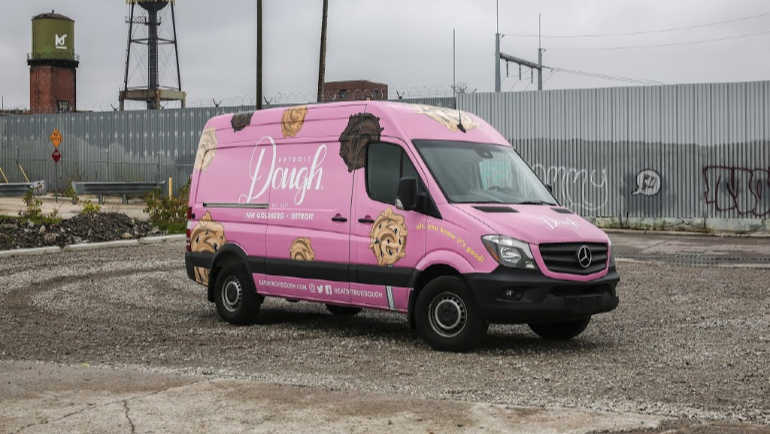Back in 2017, Wayne State graduate Daniel A. Washington and his friend Autumn Kyles came up with an idea to make a few bucks and, along the way, join the rejuvenation of Detroit’s growing food scene.
Kyles, a technology consultant, had found out about a successful edible cookie dough shop in New York and figured that Detroit was ripe for something similar. Two years later, the edible dough concept that Washington and Kyles thought was a “quaint” idea to peddle out of their NW Goldberg neighborhood to friends and neighbors has become a thriving business — aptly named Detroit Dough — that reaches into theatres, sports stadiums and even the Michigan Science Center.

“We have gained a lot of traction and have managed to sustain ourselves,” said Washington, 25, who graduated from Wayne State in 2014 with a communication degree and serves as Detroit Dough’s chief marketing officer. “We’ve had some ups and downs, but we’re doing well. And we’re hoping we can continue to grow.”
Washington said that it wasn’t difficult to get the company going, as his brother is a “self-taught” pastry chef, his sister a chemist, Kyles an M.B.A. and he a communications expert.
“I also had some property, so we pretty much had what we needed right from the start,” he explained. “I knew it was a good business model, so it made sense to try.”
After figuring out how to pack and distribute the dough, Washington and his business partners quickly began getting the word out. The group placed second in a “dolphin tank” business pitch competition. The day afterward, they opened a pop-up shop in Detroit Clothing Circle in Midtown, near the Wayne State campus.
Washington said the reaction during the first two days at the shop was overwhelming: “After we hit the pop-up circuit, we sold $8,000 worth of cookie dough in less than 12 hours. We were drawing people from Lansing, Grand Rapids, Flint, Novi — whatever city in Michigan you have, people were coming from there to buy this cookie dough.”
But after three months, Washington recalled, business began to cool. As 2018 began, he started to worry that their idea, while attractive at first, was ultimately fizzling out.
“I was anxious,” he admitted. “I didn’t really feel like we had this business any more. It seemed like there were a lot of copycats.
I didn’t know if the model was sustainable. And I was worried that, as a cash-strapped, black-owned business, we couldn’t compete.”
On a whim, the Detroit Dough team reached out to the CEO of the Emagine Entertainment theatre chain in a longshot effort to buttress their flagging, but promising, product by getting it into the chain’s concession stands. And it worked. Miraculously, the tiny cookie dough maker managed to ink a pilot deal, with hopes for a long-term distribution deal with the theatre chain, bringing Detroit Dough’s product to multiple Emagine outlets.
And while the deal eventually expired, it enabled Detroit Dough to take a major step forward. Even before the deal ended, Washington said, his company had begun to streamline its business processes in anticipation of scaling to meet demand.
Since then, the dough, edible and otherwise, has only continued to rise. Offering five distinct flavors — sugar, brownie, peanut butter, chocolate chip and plain — Detroit Dough has cemented deals to sell its product at the University of Michigan football and basketball stadiums; at the ballpark in Utica that is home to the United Shore Professional Baseball League; at Detroit City Football Club soccer matches in Hamtramck; and at the Michigan Science Center.
In July, Detroit Dough inked a deal to sell its products at the popular Bel Air Luxury Cinema complex on the city’s east side.

That deal followed an agreement earlier this year with MJR, a regional theatre chain, to sell Detroit Dough products from the concession stands at seven of its theatres just in time for Washington’s company to take advantage of the throngs flocking to see the blockbuster Avengers: Endgame.
Over the summer, Detroit Dough was also named a winner of the Detroit Demo Day showcase held at the Fillmore Detroit, earning the company a $225,000 prize.
Washington said that the company’s revenue has skyrocketed from $110,000 in 2018 to a projected $350,000 this year — not bad for a now three-person company that still packs and weighs each cup of cookie dough by hand. (By Washington’s estimation, he and his business partners have packed more than 45,000 cups of edible dough since they started.)
But Detroit Dough doesn’t just pocket its profits. Washington, who has owned property in NW Goldberg since he was 18 and still lives in the area, said that his company gives back 5% of its earnings to the neighborhood through its “Dough That Makes a Difference” pledge campaign. So far, the company has contributed more than $7,500 to the community, much of it through NW Goldberg Cares, a nonprofit that Washington founded.
Washington said the charity, as well as his entrepreneurial designs, all stem from a broader commitment to Detroit that he cultivated during his time at Wayne State.
“For me, it’s always been about being home and close to the action,” he said. “When you talk about Detroit, Wayne State plays an integral role in that. Having an institution that prepares its students, through internships, exposure, and proximity to the action, gives the WSU student an advantage. I knew I didn’t have to wait to dabble in entrepreneurship. WSU really prepared me.”
